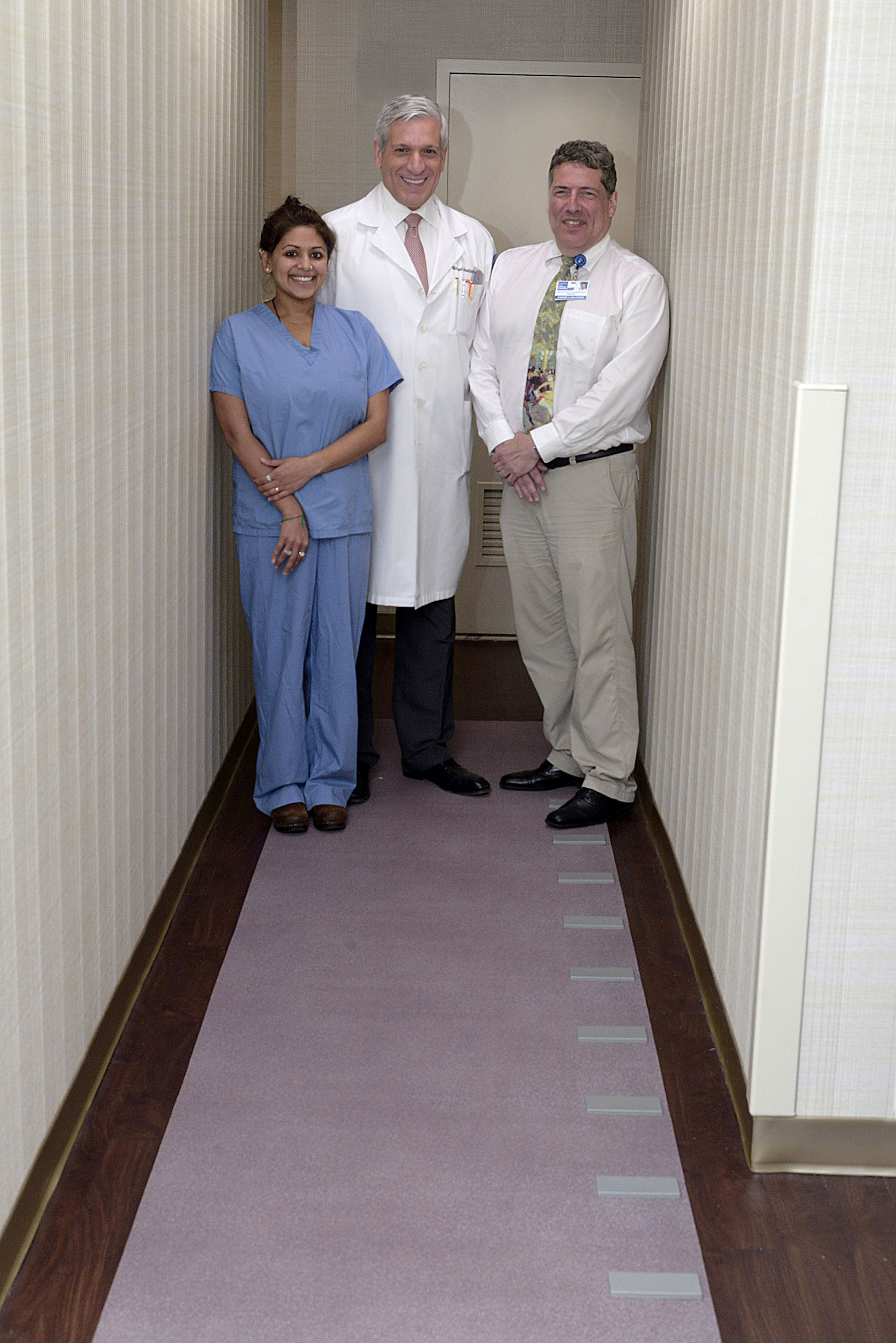Study Launched to Evaluate Early Outcomes of Different Hip Replacement Techniques Using Portable Gait Analysis System
New York, NY—July 7, 2016
 HSS study investigators with the portable gait analysis. Researchers at Hospital for Special Surgery (HSS) have launched a study using a portable gait analysis mat to determine early outcomes of several different hip replacement techniques. Gait analysis provides information about the way an individual walks.
HSS study investigators with the portable gait analysis. Researchers at Hospital for Special Surgery (HSS) have launched a study using a portable gait analysis mat to determine early outcomes of several different hip replacement techniques. Gait analysis provides information about the way an individual walks.
Investigators will test patients' walking patterns both before and after total hip replacement to measure their progress after four different surgical techniques: (1) standard hip replacement (posterior approach with small incisions); (2) direct anterior hip replacement; (3) robotic-assisted posterior; and (4) robotic-assisted anterior. The researchers seek to determine if a specific technique leads to a quicker recovery in terms of pain relief and walking patterns.
"There are various surgical approaches for a physician to consider when performing hip replacement, and among those, the direct anterior and traditional posterior have been compared extensively to determine if one approach may be superior to the other. But there is currently no literature that explores the outcomes of robotic-assisted hip replacement compared to the anterior and posterior approaches," said Michael M. Alexiades, MD, an orthopedic surgeon at Hospital for Special Surgery and principal investigator. "To the best of our knowledge, this study will be the first to compare all four approaches in one study."
The research will focus on how patients fare early in the healing process. They will be evaluated for pain and function before surgery and again six weeks after hip replacement.
While pain relief may be the number one priority for most hip replacement patients, their walking patterns after surgery are also an important indicator of progress. The mobile gait analysis system is a key feature of the study.
"Patients' walking patterns are very important. If they are not walking symmetrically or have abnormal patterns because of weakness or another issue, they may be compensating by putting pressure on their spine or other joints," said Rupali Joshi, PT, PhD, study co-investigator. "In addition to objectively analyzing functional outcomes after hip replacement, the system will allow us to tailor a physical therapy program or provide specific exercises to help patients overcome weaknesses and develop a normal walking pattern."
"We expect almost everyone to walk without pain in a relatively symmetrical manner six to 12 months after hip replacement," noted Howard Hillstrom, PhD, director Leon Root, MD Motion Analysis Laboratory at HSS. "By looking at outcomes six weeks after hip replacement, we are seeking to determine if one surgical technique enables patients to achieve a more pain-free, natural and symmetrical gait pattern more quickly."
The mobile gait analysis system consists of an electronic walkway - the mat - that contains thousands of sensors to analyze various aspects of the way a person walks. It is connected to a laptop computer with special software that measures cadence, speed, step length and other gait parameters. Data and images of the gait pattern are processed, recorded and stored in the computer. The walking test takes less than five minutes.
Not only is it an exciting technology; the mobile system is also very convenient, facilitating the collection of data for research studies, according to Dr. Joshi. Traditional gait analysis at HSS entailed a trip to the hospital's Motion Analysis Laboratory at a location outside of doctors' offices. Because the mat is portable, it can be available right in the physician's office.
Investigators aim to recruit a total of 80 patients, with 20 participants in each group for the study. Dr. Alexiades notes that researchers will seek to launch a larger study at a later date.
About HSS | Hospital for Special Surgery
HSS is the world’s leading academic medical center focused on musculoskeletal health. At its core is Hospital for Special Surgery, nationally ranked No. 1 in orthopedics for 14 years in a row and No. 2 in rheumatology by U.S.News & World Report (2023-2024). Founded in 1863, the Hospital has one of the lowest infection rates in the country and was the first in New York State to receive Magnet Recognition for Excellence in Nursing Service from the American Nurses Credentialing Center four consecutive times. The global standard total knee replacement was developed at HSS in 1969. An affiliate of Weill Cornell Medical College, HSS has a main campus in New York City and facilities in New Jersey, Connecticut and in the Long Island and Westchester County regions of New York State. In addition, HSS opened a new facility in Florida in early 2020. In 2019, HSS provided care to 151,000 patients and performed more than 35,000 surgical procedures, and people from all 50 U.S. states and 89 countries travelled to receive care at HSS. In addition to patient care, HSS leads the field in research, innovation and education. The HSS Research Institute comprises 20 translational research laboratories, 33 scientists, 10 clinician-scientists, 55 clinical investigators and 245 scientific support staff that drive the HSS research enterprise in the musculoskeletal “ecosystem,” neurology, pain management and rheumatic diseases. The HSS Innovation Institute was formed in 2016 to realize the potential of new drugs, therapeutics and devices. The HSS Education Institute is the world’s leading provider of education on musculoskeletal health, with its online learning platform offering more than 300 courses to more than 30,000 medical professional members worldwide. Through HSS Global Ventures, the institution is collaborating with medical centers and other organizations to advance the quality and value of musculoskeletal care and to make world-class HSS care more widely accessible nationally and internationally.
Need Help Finding a Physician?
+1.877.606.1555
Media Contacts
- Tracy Hickenbottom
- Noelle Carnevale
212.606.1197
mediarelations@hss.edu

